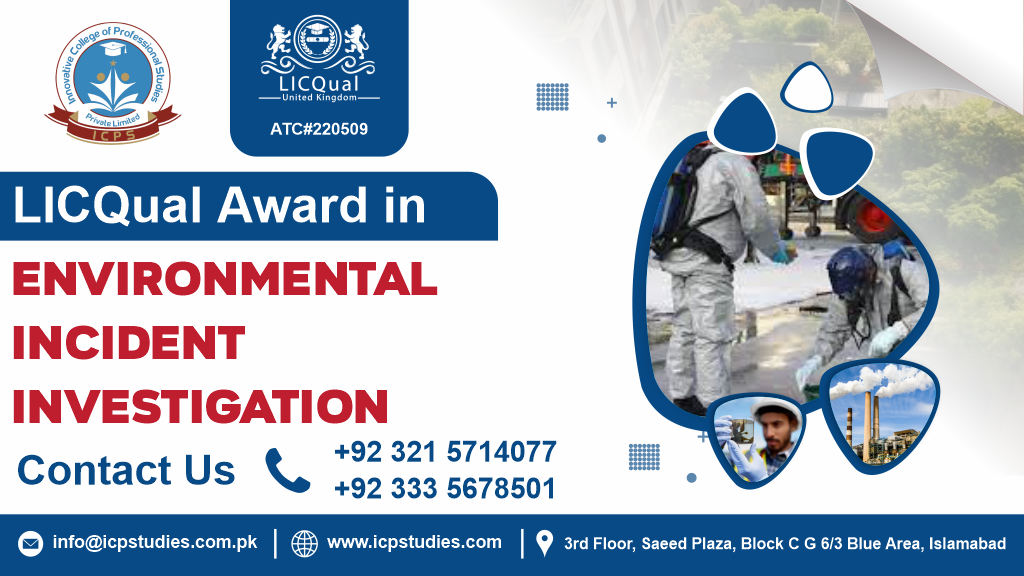The construction industry presents unique challenges when it comes to safety management. With hazards ranging from falls and electrocutions to equipment malfunctions and structural failures, the stakes are high. The LICQual Award in Construction Site Incident Investigation equips you with the tools to navigate these challenges effectively, ensuring the well-being of workers and the success of construction projects.
Delve deep into the intricacies of incident investigation with a curriculum designed by industry experts. Explore topics such as incident scene preservation, evidence collection, root cause analysis, and preventive measures tailored specifically for construction sites.
Gain practical experience through immersive simulations and real-world case studies. Put theory into practice as you learn to collect evidence, interview witnesses, and analyze data to uncover the truth behind construction site incidenfuture and the future of construction safety. Join a community of safety leaders committed to raising standards, reducing risks, and ensuring the well-being of workers on construction sites.
Don’t wait for accidents to happen—take proactive steps towards safety excellence today. Your journey begins here. Enroll now
All About Award in Construction Site Incident Investigation
Course Overview
The LICQual Award in Construction Site Incident Investigation is a specialized qualification designed to equip professionals with the knowledge, skills, and techniques necessary to conduct thorough investigations into incidents that occur on construction sites. LICQual, which stands for Learning, Improvement, and Competence Qualifications, offers a range of accredited training programs focused on workplace safety and professional development.
Construction sites present unique challenges when it comes to safety management due to the presence of various hazards such as heavy machinery, working at heights, hazardous materials, and dynamic work environments. Incidents on construction sites can range from minor injuries to major accidents, and it is essential to investigate these incidents promptly and thoroughly to determine their causes and implement measures to prevent recurrence.
Techniques for securing and preserving the scene of an incident to prevent contamination or loss of evidence. This includes documenting the scene through photographs, sketches, and written notes.
Methods for collecting physical evidence from the incident scene, such as debris, equipment, and materials. Proper handling and documentation of evidence are essential to maintain its integrity for analysis.
The LICQual Award in Construction Site Incident Investigation is suitable for a wide range of professionals working in the construction industry, including site managers, health and safety officers, construction engineers, project managers, safety consultants, and regulatory compliance officers. By completing this qualification, individuals demonstrate their competence in incident investigation and their commitment to ensuring a safe and healthy work environment on construction sites.
Study Units
Learning Outcomes
Here are the outcomes for each of the study units:
- Introduction to Construction Site Incident Investigation:
- Understand the purpose and objectives of incident investigation on construction sites.
- Familiarize with the key principles and concepts of incident investigation, including the importance of prompt response and thorough documentation.
- Gain an overview of the roles and responsibilities of individuals involved in incident investigation.
- Legal and Regulatory Requirements for Incident Reporting:
- Learn about the relevant laws, regulations, and standards governing incident reporting on construction sites.
- Understand legal obligations and responsibilities for reporting incidents to regulatory authorities, employers, and other stakeholders.
- Ensure compliance with legal requirements and maintain adherence to industry standards throughout the incident reporting process.
- Incident Investigation Process and Methodologies:
- Gain knowledge of the systematic process and methodologies used in incident investigation on construction sites.
- Learn how to initiate and manage an incident investigation, including establishing investigation teams, setting objectives, and allocating resources.
- Understand the importance of following a structured approach to investigation to ensure thoroughness and objectivity.
- Data Collection and Preservation of Evidence:
- Develop skills in collecting, documenting, and preserving evidence from construction site incidents.
- Learn techniques for gathering physical evidence, such as photographs, samples, and measurements, while ensuring its integrity and chain of custody.
- Understand the importance of accurate data collection for conducting effective incident investigations.
- Interviewing Techniques for Incident Investigation:
- Learn effective communication and interviewing techniques for gathering information from witnesses, injured workers, and other individuals involved in construction site incidents.
- Gain skills in conducting structured interviews, asking open-ended questions, and actively listening to obtain relevant information.
- Understand ethical considerations and best practices for conducting interviews in a sensitive and respectful manner.
- Root Cause Analysis in Construction Site Incidents:
- Explore various root cause analysis techniques used to identify underlying causes of construction site incidents.
- Learn how to apply methods such as the “5 Whys,” fault tree analysis, and causal factor analysis to analyze causal factors and determine root causes.
- Develop critical thinking skills to differentiate between immediate causes and systemic issues contributing to incidents.
- Generating Incident Investigation Reports:
- Develop the ability to compile comprehensive incident investigation reports that document findings, analysis, conclusions, and recommendations.
- Learn how to structure reports effectively, including executive summaries, descriptions of events, analysis of causes, and proposed preventive measures.
- Gain proficiency in communicating investigation results to stakeholders in a clear, concise, and professional manner.
- Learning from Incidents and Preventive Measures:
- Understand the importance of learning from incidents to prevent recurrence and improve safety performance on construction sites.
- Identify preventive measures and safety improvement strategies based on findings from incident investigations.
- Learn how to prioritize and implement corrective actions to address root causes and mitigate risks effectively.
Admission Criteria
Here are the entry requirements for the LICQual Award in Construction Site Incident Investigation:
- Educational Background:
- Candidates should have a minimum of a high school diploma or equivalent qualification. A bachelor’s degree or higher in a relevant field such as construction management, occupational health and safety, or engineering may be preferred but is not mandatory.
- Work Experience:
- Prior work experience in the construction industry is highly recommended. Candidates should have a minimum of one to two years of experience working in roles related to construction site management, health and safety, risk management, or incident management.
- Health and Safety Knowledge:
- Applicants should possess a basic understanding of health and safety principles and concepts, particularly as they relate to construction site operations. This knowledge can be acquired through formal training, professional certifications, or on-the-job experience.
- Communication Skills:
- Strong communication skills are essential for conducting effective incident investigations, including the ability to communicate clearly and concisely both orally and in writing. Candidates should demonstrate proficiency in English language skills, as the course materials and assessments are typically conducted in English.
- Computer Literacy:
- Basic computer literacy is required, as participants may need to use computers or digital devices to access course materials, complete assignments, and communicate with instructors and fellow students. Familiarity with word processing, email, and internet browsing is recommended.
- Commitment to Learning:
- Candidates should demonstrate a commitment to learning and professional development in the field of construction site incident investigation. This includes a willingness to engage actively in coursework, participate in discussions, and apply learning outcomes to real-world scenarios.
- Professional References:
- Some institutions or training providers may require applicants to provide professional references or letters of recommendation from supervisors, colleagues, or other individuals familiar with their work experience and qualifications.
- Additional Requirements:
- Depending on the institution or training provider offering the course, there may be additional requirements or prerequisites for enrollment, such as passing a placement test, attending an interview, or providing evidence of relevant certifications or training.
Overall, while specific entry requirements may vary depending on the institution or training provider, candidates for the LICQual Award in Construction Site Incident Investigation should possess a combination of educational qualifications, work experience, and skills that demonstrate their readiness to undertake advanced study in incident investigation and workplace safety within the construction industry.
Ideal Candidate
The LICQual Award in Construction Site Incident Investigation is specifically designed for individuals working within the construction industry who are responsible for ensuring safety, managing risk, or investigating incidents on construction sites. This course is suitable for a diverse range of professionals, including:
- Site Managers and Supervisors:
- Individuals overseeing day-to-day operations on construction sites, responsible for ensuring compliance with safety regulations, and managing the safety of workers and subcontractors.
- Health and Safety Officers:
- Professionals dedicated to promoting and maintaining health and safety standards on construction sites, including conducting risk assessments, implementing safety procedures, and providing safety training.
- Construction Engineers:
- Engineers involved in the planning, design, and execution of construction projects, responsible for identifying and mitigating safety hazards and ensuring compliance with safety regulations.
- Project Managers:
- Professionals overseeing the planning, coordination, and execution of construction projects, responsible for managing safety risks, allocating resources, and ensuring project compliance with safety standards.
- Safety Consultants:
- Experts providing independent advice and guidance on safety management practices, risk assessment, and regulatory compliance to construction companies and project stakeholders.
- Regulatory Compliance Officers:
- Personnel responsible for ensuring compliance with health and safety regulations, codes, and standards applicable to the construction industry, including conducting inspections, audits, and investigations.
- Contractors and Subcontractors:
- Individuals and teams working on construction sites, including tradespeople, laborers, and subcontractors, who are responsible for adhering to safety protocols and procedures to prevent incidents.
- Risk Managers:
- Professionals tasked with identifying, assessing, and mitigating risks associated with construction projects, including implementing risk management strategies and monitoring risk controls.
- Occupational Health Professionals:
- Personnel responsible for promoting and maintaining the health and well-being of workers on construction sites, including conducting health assessments, providing medical surveillance, and managing occupational health programs.
- Anyone Involved in Construction Site Safety:
- Individuals with a vested interest in construction site safety, including safety committee members, union representatives, and industry regulators, who are committed to promoting a culture of safety and preventing incidents in the construction industry.
Overall, the LICQual Award in Construction Site Incident Investigation is suitable for anyone involved in construction site safety management, from frontline workers to senior management, who seeks to enhance their skills and knowledge in incident investigation and contribute to creating safer work environments on construction sites.
FAQs about Award in Construction Site Incident Investigation







